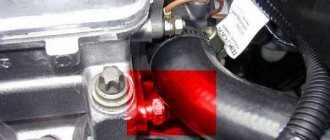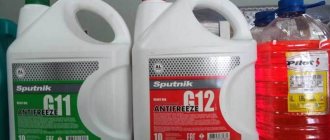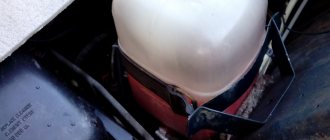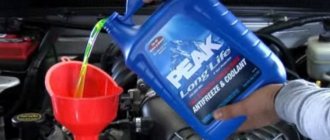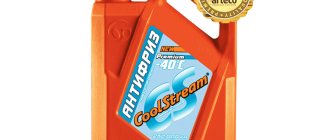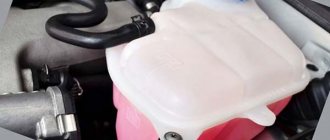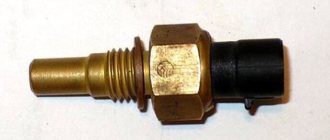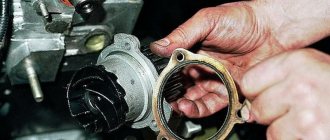During normal engine operation, without overheating, gasket failures and other unexpected troubles, the coolant can last for 150,000 km without loss of physical characteristics. However, it must be replaced in a number of unforeseen cases, as well as during scheduled maintenance, carried out either in a service center or in a garage. In this case, we have some tips.
Functions and features of antifreeze
All cars, without exception, including the VAZ 2110, use coolants to stabilize the engine temperature and maintain normal operating temperature. When the liquid loses its performance qualities, then it is necessary to replace the VAZ 2110 antifreeze, as all antifreezes are mistakenly called.
Antifreeze is a brand of antifreeze developed in 1971 by the All-Union Scientific Research Institute of Organic Synthesis Technologies. We inherited its name from our dark ancestors, who cooled their engines exclusively with water from wells and sipped cabbage soup with bast shoes. At that time, there was no antifreeze that would satisfy the requirements of the new VAZ 2101 engine, and the Italians, who developed and prepared it for production, flatly refused to guarantee normal operation of the engine using local antifreeze. Therefore, there was a need to develop a modern domestic coolant specifically for the new Zhiguli. So a whole generation began to call all antifreeze antifreeze. This is fundamentally wrong, and some bloopers are still speculating on this, passing off cheap dubious liquids as high-quality antifreeze.
When to change coolant
The first signs that the antifreeze needs to be changed cannot be ignored. It begins to foam, resulting in air pockets in the cooling system. This in turn leads to overheating of the engine, which does not bode well. Also, the unsuitability of antifreeze for further use can be indicated by an oil film on its surface and a characteristic rusty color. Replacing the coolant is also advisable if the engine was disassembled for a major overhaul and when there were cases of oil leakage into the water jacket.
Replacing antifreeze on a VAZ 2110
The process of replacing antifreeze is simple, you just need to do all the steps sequentially, and remember that coolant is poison. Handle it more carefully and wear gloves when replacing it. All work on replacing antifreeze is carried out only on a cold engine. The work flow is as follows:
- A horizontal position of the car is desirable, but if there is a slope, it is better to place it so that the front is higher. It is better, just in case, to disconnect the negative terminal from the battery and be sure to remove the cap from the expansion tank of the cooling system.
- The fluid is drained from the cylinder block quite simply on models 2110 and 2111, but on 2112 you will also have to remove the ignition module along with the bracket.
- We will place a container under the engine in the area of the plug to drain the antifreeze. We unscrew the plug, drain the antifreeze, tidy up the engine compartment using a rag, since the drain hole is designed so that the antifreeze will remain not only on the cylinder block.
- We move the container under the radiator and carry out the same operation with the drain hole in it. Let's be careful, because in this place the designers showed special care for the user. Old antifreeze spreads over the beam, it can soak the generator and the engine mounts will also have to be scrubbed. Antifreeze must leave the system to the last drop.
- The next step is very important, because if you forget about it, air pockets may form in the system. If the engine is carburetor, then you just need to disconnect the hose from the intake manifold heating fitting. In injection models, the hose is disconnected from the throttle pipe.
- Pour antifreeze into the system until its level reaches the upper edge of the expander mounting clamp and screw the plug tightly.
- We connect the heating hose in place: either on the manifold or on the throttle pipe if the engine is injection.
We start the engine and warm it up to operating temperature. We turn it off, check the level, and, if necessary, top up to the required mark. We wrap the plug tightly, not forgetting that the cooling system is sealed.
Recommendations for choosing coolant
Any antifreeze is suitable for a VAZ 2110, you just need to take into account the fact that they are painted in different colors for a reason. At first, manufacturers tried to mark liquids according to the freezing temperature threshold in this way, but there weren’t enough colors for all manufacturers, so now the color of antifreeze means almost nothing, but mixing antifreeze from different companies is highly not recommended.
The VAZ 2110 system needs to be filled with 7.5-8 liters of liquid, but it is better to buy a ten-liter container at once so that there is antifreeze left for topping up. Don't overheat the engine, and good luck on the road!
Required amount of coolant for VAZ 2110
After a certain mileage and operation of the VAZ 2110 car, it is necessary to carry out a technical inspection, monitor the level of oil and coolant in the system. After a certain period of operation, all lubricants and coolants lose their original technical and operational characteristics and require replacement. Therefore, before replacing the coolant, you need to find out how much antifreeze is in the cooling system of the VAZ 2110.
ATTENTION! A completely simple way to reduce fuel consumption has been found! Don't believe me? An auto mechanic with 15 years of experience also didn’t believe it until he tried it. And now he saves 35,000 rubles a year on gasoline! Read more"
Many inexperienced car enthusiasts, when replacing antifreeze or antifreeze in a car's cooling system, fill in 5-6 liters of fluid and make sure that it has reached the maximum level in the expansion tank, consider this sufficient and close the hood of the car. This is their big mistake , since the antifreeze has not yet had time to completely fill the system. You need to wait about five minutes until the liquid level in the tank drops significantly. Accordingly, you will need to add more coolant.
We recommend: How to fix a dent on a car with your own hands?
This procedure must be done several times, only then will it be clear how many liters of antifreeze are in the VAZ 2110 cooling system. It is necessary to add fluid until its level stops at one mark, which should be above the minimum and below the maximum level. Not adding enough antifreeze or antifreeze can cause the engine to overheat and fail. It is also impossible to overfill coolant, since when heated it tends to increase in volume.
After pouring antifreeze (antifreeze), you need to perform the following steps:
- close the expansion tank cap;
- start the engine and wait until it warms up before turning on the fan;
- turn off the engine and let it cool down;
- Check the coolant level in the tank and top up if necessary.
A VAZ 2110 needs to be filled with approximately 8 liters of coolant. This is a rather important procedure on which the life of the car engine depends.
Note to car owners
Please know that if you do not replace the antifreeze in a timely manner, then premature corrosion begins in the channels of the engine block and its head and, as a result, the engine life is significantly reduced:
- This affects the cylinder head the most.
- Working as a car mechanic, I often had to disassemble engines and observe the head cooling channels eaten away by corrosion
- After such a spectacle, anyone will feel scared for their car; you will certainly forget to change the antifreeze in a timely manner.
- At each scheduled maintenance, you need to check the level and appearance of antifreeze (more often if possible)
Important: The antifreeze level must be checked on a cooled engine; the permissible level is within (between) the lower and upper marks on the body of your expansion tank. A slight increase or decrease in this level that occurs when it is cooled or heated is not considered a malfunction; this is absolutely normal. Such level fluctuations are associated with thermal changes in volume (for example, expansion when heated and subsequent decrease in volume when cooled). However, if you notice a gradual decrease in the level with each new check on a cold engine, then you need to look for where the leak is occurring.
When is it necessary to change the coolant on a VAZ-2110
There are no specific regulations for replacing the cooling system fluid and there are several reasons for this.
Dirty coolant in the expansion tank.
The type of coolant greatly affects its service life and this must be taken into account.
- For example, inexpensive liquids based on ethylene glycol can last up to one and a half to two years .
- More modern antifreezes of class G12, G12+, G13 can easily last up to 4 years.
However, the replacement period may be dictated by the condition of the fluid:
- oily spots on the surface of the liquid;
- complete loss of color;
- foreign particles in the expansion tank;
- foaming and frequent boiling of antifreeze;
- loss of density due to frequent addition of distilled water.
These signs will indicate that it is time to change the antifreeze.
Inspecting the reservoir and the condition of the coolant (color, shape, dirt and foreign impurities) should become a habit!
Antifreeze selection basics
For replacement, we select, if possible, the same antifreeze that was originally poured into the engine.
Otherwise, the cooling system must be flushed , since mixing antifreeze of different brands and even different manufacturers can lead to sedimentation, clogging of the cooling system and the antifreeze losing its lubricating, cooling, flushing and antifreeze properties.
Draining antifreeze from the VAZ-2110
Before draining antifreeze or antifreeze from a VAZ-2110 car, you need to find a suitable site for work. This could be a garage or other flat area. If you do not have the opportunity to carry out work indoors, then you can install the car so that its front part is slightly higher than the rear. Next follow the instructions:
- Disconnect the negative terminal of the battery to de-energize the vehicle.
- Remove the ignition module with bracket.
- To increase the pressure in the cooling system, it is necessary to remove the expansion tank cap.
- Next, install a wide, cut canister or bucket under the power plant into which you will drain the coolant that has expired.
- Unscrew the antifreeze drain plug on the engine block. After this, you will only have to wait until the coolant is completely removed from the system. Wipe the plug and drain hole with a rag.
- Repeat the procedure with the radiator. Place the bucket and unscrew the cap on its bottom. Wait until this unit is empty, then wipe the drain hole and plug with a clean rag.
If your VAZ-2110 has an injection engine with 16 or 8 valves, when draining the antifreeze, you must carefully remove the antifreeze supply hose from its connection with the throttle pipe heating fitting. To do this, you will need to loosen the clamp holding it.
On cars with an engine equipped with an injection system, it is necessary to remove the hose at its connection with the carburetor heating fitting. The steps described for each engine will help you get rid of air locks in the system.
What are the dangers of air jams?
Often, inexperienced owners “boil” the engine, and the engine overheats. This usually happens when the car is moving in low gear, when the VAZ 2110 16 valve coolant sensor does not operate and the electric cooling fan does not turn on. An experienced driver monitors the readings on the instrument panel while driving and can promptly notice that the antifreeze temperature needle has entered the red zone. What signals the approach of overheating, which means it is important to take emergency measures:
- You need to immediately (regardless of the season of the year) turn on the “stove”
- When the heater fan blows hot air, this means the fan is broken.
- When it blows cold, the cause of overheating lies in the airlock that has arisen.
- In the first situation, it is prohibited to turn off the engine until, thanks to the running “stove,” the engine temperature drops
- In the second situation, you can turn off the engine, then, after waiting for the engine to cool, remove the expansion tank cap
- Then unscrew the hose as described above and add antifreeze, allowing air to escape
That's all with replacement, the video lesson will help you if you don't understand something. Good luck with the renovation.
Coolant selection
First, you need to figure out how much coolant is provided in the VAZ 2110. This will allow you to purchase the required amount of antifreeze and correctly carry out the replacement procedure.
New coolant
So, the expansion tank should be filled with 7.8 liters of coolant. Although in reality, when draining, you will only get about 7 liters. Part remains inside. Therefore, when filling, there is no need to fill all 7.8 liters. 7 liters is enough.
We have already understood how much coolant is provided in the VAZ 2110, and how much needs to be filled. So it's time to choose.
In order to make a smart purchase of a new antifreeze, follow a few simple rules.
- Purchase a liquid with the same characteristics, color and production that was used previously. Of course, if the previous coolant worked effectively. Mixing different types of antifreeze is a common mistake that can lead to unpredictable consequences.
- Take a closer look at the packaging of the liquid you purchased. Today they sell both ready-to-fill formulations and concentrates, which must be diluted before use.
- Replace antifreeze only when the engine has completely cooled down.
- Start the engine after replacing the coolant strictly after all connections are made and the expansion tank cap is closed.
Preparing to replace antifreeze
Before changing antifreeze, you need to drain the old one, and this is completely logical. In total, the tank contains approximately 7.8 liters of antifreeze. You can drain 7 liters without any problems. This means that for replacement you will need only 7 liters of fresh antifreeze.
Choosing antifreeze important features:
- It is best to buy antifreeze from one manufacturer. If there is a strong difference in composition, the mixture in the tank may not be very good. And this can damage the health of the car.
- You need to pay attention to the type of liquid. If it is a concentrate, then it will definitely need to be diluted.
- It is necessary to replace the coolant after the car has completely cooled down. And it will be possible to start the car only when everything is finally connected and checked for leaks. Otherwise all the problems will come out again.
Nuances of antifreeze
There are many opinions as to whether antifreeze is actually better than antifreeze. We will not prove our position, but rather we will tell you a few facts.
Why is it better to use antifreeze when replacing coolant in a VAZ 2110? The choice is always up to the car owner, but this particular coolant has a wide range of advantages:
- When heated, the degree of expansion of antifreeze is less than that of water. Therefore, the presence of even a small gap for expansion will allow it to protect the system from rupture and maintain the integrity of the pipes and caps of the expansion tank;
- The boiling point is higher than that of water;
- At sub-zero temperatures, the coolant does not turn into ice and acquires a gel-like structure, which does not lead to rupture of the cooling system (CO);
- Does not form foam;
- Does not cause corrosion. Moreover, it has the function of preventing its occurrence.
You also need to fill it correctly
Now that you know how to drain antifreeze from a VAZ-2110, you can talk about how to properly fill in fresh refrigerant. This process is much simpler than the previous one, but there are some nuances here.
The main task facing a car owner who is pouring coolant into the system is to prevent air locks from occurring in it. No, they are not dangerous for the engine, but they are extremely undesirable, especially in winter, when the “stove” operation is necessary. Plugs create obstacles to the normal circulation of the refrigerant, and in addition, reduce its volume in the system. So it turns out that we filled in 6-7 liters, but the “stove” does not heat as it should. And the troubleshooting begins.
But when filling in antifreeze, all you need to do is disconnect the hose from the throttle assembly and fill until the refrigerant flows out of it. After this, we put the hose on the fitting and continue to fill the liquid to the level. When it is reached, without closing the expansion tank cap, we start the engine, wait until it warms up to operating temperature, and “pump” the hoses going to the cooling radiator, periodically squeezing them with our hands. Air, if there is any, will definitely come out. All you have to do is add liquid to the level.
Procedure for replacing fluid in the cooling system
Before adding any coolant, close the engine and radiator caps, and then fill the system with antifreeze. It will be required so much that the liquid level in the expansion tank reaches the point where the belt fastening passes.
Upon completion of work, tightly screw the cap of the expansion tank and return the hose leading to the heating system. Please note that high pressure occurs in this assembly. If you do not tighten the plug tightly enough, it may break off during operation. This will inevitably lead to antifreeze leakage.
Before starting the engine, perform reverse assembly - install the ignition module and return the negative terminal to the battery. After the work described in this section, you can start the engine to warm up. You shouldn’t start driving right away - let the engine run for a while, and then check the fluid level in the expansion tank. If there were air pockets in the system, the amount of antifreeze will decrease. The top edge of the fluid will not reach the location of the belt on the reservoir. In this case, let the car sit for a while and then add antifreeze.
Sometimes, by warming up the power plant, the air plugs are not pressed through. In this case, it is necessary to repeat the procedure with the hose (described in the previous section), at the same time open the cap of the expansion tank. After excess air has escaped, it is necessary to add antifreeze to the required level.
Why is it flowing?
Many drivers complain that coolant sometimes leaks, whether it’s antifreeze or antifreeze. The reasons why the coolant is leaking may be the following:
- loosening of pipe clamps;
- pipes are worn out and need to be replaced;
- there may be air in the system, that is, an air lock;
- insufficient coolant level;
- problems with the radiator;
- the damper is not tightly closed;
- There may also be other malfunctions of the cooling system.
Stages of work with replacing coolant in a VAZ 2110
Before starting the main stages of work, it is necessary to prepare the work surface, tools and equipment.
During such work, the vehicle is placed on flat surfaces or at a height. The engine must be completely cool.
The replacement process will require small containers, 8, 13 and 17 wrenches, water and new antifreeze.
Replacing antifreeze with antifreeze in a VAZ consists of the following steps:
- coolant drain;
- flushing the system;
- filling in new refrigerant.
In VAZ 2109, 2111, 2114 models, flushing the cooling system is not necessary. It is only required if the drained antifreeze was contaminated with rust or scale.
In models VAZ 2111, 2109, 2106, 2110, before replacing, it is necessary to disconnect the negative terminals of the battery so that a short circuit does not occur when draining the antifreeze.
In models 2110, 2112, 2115, after draining the fluid, the car should be started and the engine should be left running for 4-5 minutes so that all the fluid is pumped through and out of the system. Without this moment, the remaining antifreeze, which is not removed independently, will mix with the antifreeze and can lead to engine damage.
Draining antifreeze
It is best to drain the liquid at a height: the car should be placed on a lift, overpass or above a repair pit.
Before draining antifreeze on a VAZ 2110 and other models, make sure that the system has completely cooled down.
Draining is quite simple:
- A container for old antifreeze with a volume of 10 liters or more is placed under the car.
- The cover is removed from the expansion tank of the system and the drain plug is unscrewed from the cylinder block with a key set to “13”.
- During the process, the plug can be supported so that it is not blown away by the pressure of the liquid.
When the antifreeze is drained from the VAZ block, the plug is screwed back on. The next step in draining is draining the antifreeze from the system radiator. The process is carried out in the same way as with the cylinder block. You can also tighten the cap on the radiator yourself, without any equipment or tools.
Flushing the system
Flushing, as a step when replacing antifreeze, is necessary if the car is already very old and the cooling system has never been cleaned. On the other hand, the risks increase that if you flush the system during replacement, you can clog the radiator, thermostat and heater radiator.
Washing is carried out as follows:
- old antifreeze is drained;
- all plugs are screwed into place;
- Distilled water is poured into the tank to the maximum level;
- the engine starts and warms up to operating temperature;
- the working engine is left for 5-10 minutes;
- the car turns off and cools down;
- After cooling, the water is drained from the tanks.
If the water remains dirty when draining, the operation must be performed several times until it becomes clean.
Filling with new antifreeze
When adding new coolant, you will need about 9 liters of new coolant. Ideally, antifreeze in a VAZ 2110 should be replaced every five years, but on older models it is better to change the fluid every second year.
Filling in new antifreeze occurs step by step:
- The drain plugs are screwed in;
- The hose on the throttle assembly is unscrewed;
- New fluid is gradually poured in;
- You should stop when the antifreeze reaches the extreme level;
- The hose is twisted;
- The liquid is added to the maximum mark;
- The tank closes and the engine with the stove starts;
- The engine warms up to operating temperature and turns off;
- The replacement has been made.
The procedure is standard, but not suitable for all systems. How to change antifreeze to antifreeze in a VAZ with 16 valves? The procedure is carried out differently. After the liquid is poured into the tank, air is removed through the expansion tank, then the car starts and you need to drive it for several kilometers. The system is checked again and the liquid that has escaped is added.
Why is it worth switching from antifreeze to antifreeze: pros and cons
What is better: antifreeze or antifreeze and why it is worth replacing one with the other - these are questions that many drivers of domestic cars ask.
The advantages of antifreeze in these matters are obvious:
- high boiling points;
- long service life;
- cleans the cooling system;
- produced for long mileage.
Antifreeze is a cooler that was created for the domestic auto industry, and for many years it served our cars. However, antifreeze had to be changed every 2 years, and antifreeze is designed for 5 years of operation.
In fact, antifreeze and antifreeze are the same thing. Only the latter is an improved version of the liquid. It follows from this that replacing the refrigerant in a VAZ is an important procedure that has a positive effect on the operation of the engine and other components.
When you decide to replace antifreeze with antifreeze in your car, follow the instructions, because the slightest mistake can lead to major damage to the car’s systems.
Safety rules when replacing antifreeze
It is worth remembering that antifreeze itself is quite toxic, and breathing it is quite dangerous, it also has a bad effect on the mucous membranes of the nose and eyes, and you can get a lot of burns with its help.
The main rule for changing antifreeze is that the engine must be cold.
, otherwise harmful fumes will get on your face, and the consequences cannot be avoided.
Try also not to touch the antifreeze, as after this, through negligence, you can accidentally transfer some of it to your face.
If you accidentally spill coolant, simply wipe it off with a damp cloth or tissue.
When replacing antifreeze, remember that you need to change it not only in the cold, but also in the warm season, this way you will protect yourself not only from the fact that the car may not start in the cold, but also from boiling liquids. It needs to not only be changed, but also periodically topped up, because an insufficient amount of it causes it to boil, which has a bad effect on the operation of the car. Caution when working with the machine is the main thing, because it is filled with many liquids harmful to humans.
I don’t know why, but even many experienced owners drive their cars for more than 100,000 kilometers and never replace antifreeze or antifreeze during this period (depending on what is filled). In fact, this fluid needs to be changed every 2 years or the car's mileage of 45,000 km, whichever comes first.
If you do not change the coolant in a timely manner, then corrosion may appear in the channels of the block and cylinder head ahead of time and the engine life, of course, will be reduced. This is especially true for the cylinder head. Quite often I had to disassemble engines and look at the cooling channels in the cylinder head eaten by corrosion. After such a picture, you become scared for your car and you will definitely not forget to change the antifreeze on time.
So, below I will provide a more detailed report on the completion of this work, and also provide a list of the necessary tools:
- Head for 10 and 13
- Ratchet
- Phillips screwdriver
- Keys for 13 and 17 (provided that you have a 2111 engine and will have to remove the ignition module)
I’ve already said it above, but it’s better to repeat it again. If you have a 2110-2112 engine, then the antifreeze drain plug located in the block is free and can be used without any problems. If the engine model is 2111, then an ignition module is installed there, so it will have to be removed first. Here is its location (below the 4th cylinder):
After it is removed and set aside to avoid flooding with antifreeze, you can begin further work. We unscrew the front part of the engine crankcase protection so that you can place a container under the radiator drain hole.
Now we unscrew the cap of the expansion tank, then the plug in the engine block and radiator, of course, you first need to place a container of the required volume under each drain hole.
Here is the plug in the block after unscrewing:
And here on the radiator:
It is worth noting that when draining coolant on a VAZ 2110-2112, the car must be on a flat, flat surface. After all the antifreeze has drained, you can screw the plug into place in the cylinder block and radiator. Next, you can begin replacing the coolant. To avoid an air lock in the cooling system, first disconnect the fluid supply hose to the throttle assembly, which is shown in the photo below:
And when pouring antifreeze into the expansion tank, you need to pour it until it flows out of this disconnected hose. Then we put it on the terminal and tighten the clamp. Next, top up to the required level and tighten the tank cap.
We start the engine and let it warm up until the radiator cooling fan comes on. We wait until the car has completely cooled down (the morning after the replacement) and look at the fluid level in the conservator.
If it is below normal, then you need to add the required amount.
Replacing the coolant is one of the ways to prevent failure of the components of the heat removal system from the engine. It’s not difficult to replace antifreeze yourself; all you need to do is have a garage and watch the detailed instructions on video. The work is carried out according to the same scheme, regardless of which power unit is installed on the vehicle. The VAZ-2110 may have a carburetor system or an injector with 8 or 16 valves.
Optimal coolant option
When we figured out how to replace antifreeze on a VAZ 2110 (2112),
It is important to choose the optimal liquid option . Many car enthusiasts only use expensive antifreeze, considering it to be of higher quality. For VAZ cars, it is quite possible to use a cheap domestic product - antifreeze, the characteristics of which were developed specifically for these cars.
Owners of domestic cars respond positively to Felix brand antifreeze. It is sold in canisters of 5 and 10 liters, and smaller containers. It is profitable to purchase liquid in a 10 kg container - it is cheaper, and after replacing the used antifreeze, there is still liquid left for refilling.
Is there a difference in the processes of draining antifreeze in eight- and sixteen-valve engines?
There is a difference, and it is significant. The fact is that the “tens” engines have different designs. In terms of draining antifreeze, a VAZ-2110 with 8 valves is more convenient than a dozen with sixteen valves. The first has a coolant drain plug located on the front of the cylinder block. To get to it, you don’t need to drive the car into the inspection hole or remove the protection. But for sixteen-valve power units, the plug is located at the bottom, and can even be closed by the starter, so before draining the antifreeze from the VAZ-2110, you will need to drive the car into a pit (overpass), remove both the protection and the starter. Let's take a closer look at this process for each engine.
We drain the antifreeze ourselves
To drain antifreeze and fill in new fluid, we need a drain container with a volume of at least 7.5-8 liters.
You will also need keys and flushing fluid if the system needs to be cleaned.
To refill the system, 7–7.5 liters of finished liquid . This must be taken into account if we pour the concentrate and dilute it with distilled water. It is advisable to carry out the work with gloves, since antifreeze is toxic. Before replacement, we will conduct a detailed inspection of the system, eliminate fluid leaks, and replace failed pipes and clamps.
Algorithm
We carry out replacements on a cold engine according to the following algorithm:
- We place the car on a level surface; if possible, we place the car so that its front part is slightly higher than the rear.
- Remove the negative terminal from the battery.
- We install the heater valve in the extreme right, hottest position.
Turn the heater control knob to the right until it stops.
- Remove the engine protection, if installed.
Unscrew the screws securing the engine protection.
- Disconnect the wires from the ignition module and remove it to provide access to the drain plug on the cylinder block.
Disconnect the connector.
Unscrew the fastening bolts.
We take out the ignition module.
- Remove the plug from the expansion tank.
- We place a container under the radiator drain plug, unscrew it and wait until all the liquid flows out.
Unscrew the plug at the bottom of the radiator.
- Place a container under the cylinder block plug. We are waiting for the old fluid to be completely removed.
Using a 13 key, unscrew the plug on the front side of the cylinder block.
- After draining the antifreeze, wipe the cylinder block and radiator with a rag, replace the block plug and tighten the plug on the radiator.
- Remove the throttle body heating hose. This will avoid the formation of an air lock in the system.
Disconnect the fluid supply hose to the throttle body.
- Fill the expansion tank with new antifreeze to the maximum level and screw on the cap.
Fill with antifreeze to the required level.
- We put the hose in place on the throttle assembly.
- We put the ignition module in place and screw the negative terminal to the battery.
- We start the engine; as it warms up, the fluid level may drop. In this case, we will add fresh antifreeze to the required level.
Warm up the engine to operating temperature.
- We check the system for leaks.
Check the coolant level in the expansion tank.
Location of the antifreeze reservoir
The expansion tank through which antifreeze is poured is located under the hood of the car near the radiator. It looks like a plastic container connected to the radiator with a hose. On the side of the container there is a scale for measuring the coolant level. The car owner must regularly check the refrigerant level, and when it reaches the minimum level, add the required amount.
Draining the liquid and flushing the system
The procedure for replacing antifreeze in a VAZ 2110 car consists of the stages of draining the old coolant, flushing the system and adding fresh antifreeze.
Draining the old coolant from the VAZ 2110 must be done on a cold engine. To do this you will need to take a few simple steps:
- Drive the car onto a pit or overpass, position it as horizontally as possible;
- Raise the hood, remove the negative terminal from the battery;
- Unscrew the engine crankcase protection;
- Remove the ignition module with the bracket, having first disconnected the wires and their connector from it;
- Unscrew the expansion tank cap;
- Place the prepared container, unscrew the drain plug on the cylinder block;
- After completely draining the coolant from the block, carefully wipe off any splashes of antifreeze from the engine;
- Move the container under the radiator drain hole, unscrew the cap;
- Drain the remaining refrigerant, carefully tighten the plugs of the cylinder block and radiator.
After draining the used antifreeze, you can proceed to the flushing step to improve coolant circulation:
- Pour distilled water with a special additive into the system through the expansion tank;
- Screw on the tank cap and warm up the car for 10-15 minutes to dissolve the scale;
- Drain dirty water as described above.
After this, to completely flush the system, you can flush the radiator, engine and stove with a stream of clean water under pressure:
- Disconnect the pipes from the bottom of the radiator and from its upper tank;
- Insert a hose into the upper radiator pipe and turn on the water under pressure. Monitor the quality of the outgoing water until it becomes clear. Connect the pipes to the system;
- Move the hose to the outlet of the internal combustion engine thermostat, turn on the water, rinse until clean water starts coming out from below;
- Release the 2 hoses coming from the heater and extend them with garden hoses. Place a container under the lower hose and connect water to the upper hose. Drain until clean water appears.
After flushing the VAZ 2110 system, you need to connect all the pipes to their original places.
Filling with new antifreeze
Stages of filling fresh refrigerant into the cooling system:
- In a car with an injection engine, loosen the clamp and disconnect the antifreeze supply hose from the throttle assembly. In a carburetor engine, disconnect the carburetor heating hose;
- Fill antifreeze through the expansion tank to the top of the fastening belt;
- Screw on the tank cap, attach the hose in place;
- Replace the ignition module, connect the battery terminal;
- Warm up the car, check the coolant level. Top up if necessary.
Replacing the VAZ 2112 16 valve coolant is done in the same way as on the VAZ 2110. The design of the cooling system of these car models is similar to each other.
If you strictly follow the step-by-step instructions for replacing the refrigerant in a VAZ 2110 car, the work will not take the car owner much time. The instructions will help the car enthusiast save time and money that he would spend on a trip to a car service center.
Step-by-step photo and video instructions for independently replacing the coolant in the cooling system on VAZ 2110, 2112, 2111 cars.
Attention! Work on replacing the coolant must be done with a cold engine.
1. Unscrew the expansion tank cap
2. Unscrew the cap in the lower right corner of the radiator and drain the liquid into a container.
3. Unscrew the plug on the front side of the cylinder block.
4. On the VAZ 2110 AND VAZ 2112 engines, it is easy to unscrew the plug. On the VAZ 2111 engine you will have to remove the ignition module.
5. Once the liquid has drained, tighten the plugs.
6. Fill new coolant through the expansion tank.
7. Start the engine and add fluid.
8. Warm up the engine with the expansion tank cap closed.
9. Allow the engine to cool. After this, check the coolant level. If necessary, add more.
General cooling system maintenance tips
First of all, you need to adhere to the following safety tips:
- Cool the car completely; its engine should be completely cold.
- Remember that antifreeze is a fairly toxic liquid, so you should not allow it to get into the stomach, skin or eyes. Wear gloves when working.
- After you fill in new antifreeze, you can start the car only after installing the expansion tank cap in place.
If you have replaced the heater core, you need to check the operation of the fan. To do this, monitor the coolant temperature on the dashboard. If the arrow reaches the red zone and the fan still does not turn on, you need to turn on the airflow from the heater. Cold air indicates an air lock, and hot air indicates a fan malfunction.
You can remove the plug from the air when the power unit is turned off and cooled; to do this, you just need to unscrew the cap of the expansion tank.
Why is it flowing?
Many drivers complain that coolant sometimes leaks, whether it’s antifreeze or antifreeze. The reasons why the coolant is leaking may be the following:
- loosening of pipe clamps;
- pipes are worn out and need to be replaced;
- there may be air in the system, that is, an air lock;
- insufficient coolant level;
- problems with the radiator;
- the damper is not tightly closed;
- There may also be other malfunctions of the cooling system.
When to change coolant
Not all motorists know what the life cycle of antifreeze is. It is approximately 150 thousand kilometers. In theory, maybe more, but it’s better not to risk it and, for the sake of prevention, change it even more often.
Drain plug
There are several situations that will require you to carry out a mandatory coolant replacement procedure.
- The color of the coolant has changed. The liquid may take on a rusty color. This indicates the need for replacement.
- An oil film has formed on the surface of the cooler.
- Antifreeze often bubbles in the expansion tank of a VAZ 2110. Moreover, there were no prerequisites for such a phenomenon. The Ten is a car for good speeds, because when driving at low speeds, the antifreeze in the expansion tank on the VAZ 2110 often boils. This is because the cooling fan does not turn on.
- A coolant that is no longer suitable for further use may also boil, the composition of which has changed significantly since it was poured into the expansion tank.
- Antifreeze is leaking somewhere from the expansion tank on a VAZ 2110. The situation is common, but it cannot be solved by adding or replacing coolant. It is necessary to find where the antifreeze is leaking from the expansion tank of the VAZ 2110. Usually the leak is found on the clamps, although it would not be a bad idea to check the entire system.
- The coolant level may be normal, during operation it does not emit antifreeze from the expansion tank of the VAZ 2110, the color is normal, but still the boiling process occurs quickly. Most likely, the reason lies in the airlock.
Operating procedure
Draining old coolant
If the replacement is made on a lift or inspection pit, it is necessary to remove the engine protection, if any. When replacing without a pit, you don’t have to remove the protection, but then old antifreeze will get on the protection. There is nothing dangerous about this, but for a few days after the replacement, you may smell antifreeze until it evaporates. We place a drain container under the lower right side of the radiator, if conditions permit.
If you are not changing it in an equipped place and you do not need the old antifreeze, you can simply dump it on the ground. Many people advise initially opening the cap of the expansion tank, then unscrewing the plug at the bottom of the radiator to drain, but in this case old antifreeze under high pressure, especially if the engine has not completely cooled down, will flow out of the radiator. It is safer and more convenient to first unscrew the cap (plastic wing) of the radiator, the old antifreeze will flow in a thin stream, then carefully unscrew the cap of the expansion tank, thereby, due to the tightness in the cooling system, you will be able to regulate the antifreeze drain pressure.
After draining the antifreeze from the radiator, we need to drain the liquid from the engine cylinder block. The peculiarity of draining antifreeze on a VAZ 2110 from the cylinder block is that the plug on the block is closed by the ignition coil (on a 16-valve injection engine). To do this, we need to dismantle it, use a 17mm wrench to unscrew the bottom bolt of the coil bracket, use a 13mm wrench to unscrew the side and central bolts securing the bracket and move the coil to the side. Using a 13 key, unscrew the drain plug from the cylinder block. To more completely remove old antifreeze, you can connect an air compressor and apply air pressure through the filler neck of the expansion tank.
We tighten the plug of the cylinder block and the plug on the radiator (the plug on the radiator is plastic with a rubber gasket, it can be tightened by hand without unnecessary force; for reliability, you can coat the threads of the plug with sealant). We put back the ignition coil.
Filling with new coolant
Before adding new antifreeze to the VAZ 2110, it is necessary to disconnect the heating hose to the throttle valve (for an injection engine), or the hose from the carburetor heating fitting (on a carburetor engine), so that excess air can escape from the cooling system. Fill in new antifreeze to the level of the upper part of the fastening of the rubber belt of the expansion tank. We connect the hoses to the throttle valve or carburetor, depending on the model. Close the expansion tank cap tightly. Open the heater tap in the cabin to the hot position.
Filling antifreeze into a VAZ 2110
We start the engine. Immediately after starting the engine on a VAZ 2110, you need to pay attention to the level of antifreeze in the expansion tank; it may immediately drop, this may mean that the water pump has pumped coolant into the system. We turn off the engine, top up the level and start again. We warm up the car. During warm-up, we check for leaks in the engine compartment, in places where hoses and plugs were removed. We monitor the engine temperature.
When the operating temperature reaches 90 degrees, turn on the heater; if it heats with warm air, turn it off and wait for the engine cooling fan to turn on. When you turn on the fan, wait for it to turn off, turn off the engine, wait 10 minutes for the engine to cool down a little, unscrew the cap of the expansion tank, check the coolant level, and add if necessary.
Instructions for replacing the expansion tank in VAZ 2110-2115 cars can be found here: https://vazweb.ru/desyatka/zamena-rasshiritelnogo-bachka-vaz-2110.html
How to change coolant
Before replacing antifreeze, you need to know that this can only be done on a cooled engine. Antifreeze and antifreeze are aggressive chemicals that can cause harm to the human body, therefore, follow safety precautions and carry out all work with gloves. You can start the car after changing the fluid only after you make sure that the reservoir cap is tightly screwed on.
Drain the coolant
Many drivers are interested in how to drain antifreeze from a VAZ 2110 and do it quickly and correctly.
Before you start changing the antifreeze, you need to place the machine on a horizontal platform. And if this is not possible, then make sure that the back is slightly lower than the front.
- Disconnect the negative terminal from the battery.
- Together with the bracket, remove the ignition module.
Ignition module
- We unscrew the cap of the expansion tank, having previously installed a 10 liter capacity to drain the used coolant.
Draining old fluid
- Drain the cooler.
- We wipe the cylinder block from any remaining fluid.
- We tighten the plugs of the radiator and cylinder block.
Filling with coolant
- Before disconnecting the coolant supply hose, loosen the clamp.
- If the engine is equipped with a carburetor, then you need to disconnect the hose from the fitting so that air can escape during filling.
- We begin to pour antifreeze into the system (about 7-8 liters will be needed) until its volume reaches the level of the upper line of the expansion tank fastening belt.
We pour new antifreeze through the funnel
- Be sure to tighten the plug tightly, otherwise if the coolant boils, it may splash out.
- We connect the hose.
- We put the ignition system in place.
- Connect the “-” terminal to the battery.
- We start the engine and wait for it to warm up to operating temperature.
Liquid level in the tank
- We look at the position of the sensor pointer and the level in the tank;
- After a few days, it is advisable to check and determine whether the coolant level in the expansion tank is normal.
How to replace the cooler?
To replace antifreeze, you need to perform only three steps: drain the old one, flush the radiator if desired, and fill in a new one. But in order to fulfill them, it is worth taking into account certain features of this car.
- First, you need to know how to drain the coolant from a VAZ 2110. This can only be done when the engine has completely cooled down and the car is standing on a flat, horizontal surface. If the surface is not level, it is acceptable if the front of the machine is slightly higher.
- In order to drain the old antifreeze, you need to: remove the ignition module and disconnect the wire from the negative part of the battery, so you will have access to the hole. Then you should open the cap to the expansion tank
, place a container of the required volume, unscrew the cap, and drain the antifreeze from the engine block. - If you refill the cooling system with antifreeze, it is not necessary to flush it, but if the cooler is from a different manufacturer, it is necessary to flush the system. If two liquids react, they may partially change or lose their properties.
- You need to fill the liquid to the proper level
; for this there is a special mark inside the expansion tank. When the coolant level reaches the proper level, the tank cap must be screwed on tightly. When the engine starts, there will be pressure inside the tank and then the antifreeze will flow, which will lead to dire consequences. - After replacing the coolant, reinstall the battery cable and ignition module. Carefully inspect: there are no traces of antifreeze on the surface of the engine; if there are any, wipe the area with a damp cloth.
To replace the coolant on a VAZ 2110, you need to be extremely careful; for this, there are several rules for inexperienced drivers who are faced with this situation for the first time.
Replacement features
If there are small leaks in the engine cooling system and the car owner periodically adds water or antifreeze from different manufacturers, the old coolant may take on a rusty color. Foreign bodies may appear in the form of small chips and rust, which, by the way, can lead to failure of the main elements of the cooling system, water pump, thermostat, heater tap, etc.
Flushing the VAZ 2110 cooling system
In this regard, when replacing old antifreeze in this condition, it is necessary to flush the system. This can be done using different additives, which is not always beneficial for the cooling system. Low-quality cleaning additives may not only not help, but also damage the components of the cooling system. Therefore, it is necessary to use high-quality additives and not skimp.
You can also flush the system naturally with distilled water. After draining the old antifreeze, water is added. The car idles for 10-15 minutes, then it is drained again and new antifreeze is added. If there is severe rust, you can repeat the procedure.
There is a cheaper and easier way; you can simply flush the system with plain water by opening the radiator and engine caps in sequence. Those. the engine cap is unscrewed and water is spilled through the expansion tank. Then the engine plug is closed and the radiator drain plug is opened. Do only in this sequence, since the radiator is at the lowest point and all the water will pour out.
Antifreeze and antifreeze: differences
Coolants from different manufacturers differ in their production and manufacturing processes, as well as in the additive packages they contain.
The recommendations specified in the operating manual or service book (name, manufacturer, fluid class, etc.) will help you choose the right fluid.
Depending on the production technology, there are three types of coolant:
- traditional production technology (the liquid contains additives based on salts of inorganic acids);
- carboxylate production technology (the liquid contains additives based on organic salts);
- hybrid production technology (creation of additives based on carbon salts with a low content of phosphates and silicates).
Antifreeze is produced using traditional technology, and antifreeze is produced using carboxylate technology. Both antifreeze and antifreeze have a number of positive properties (increased efficiency of the internal combustion engine cooling system, anti-corrosion properties, etc.).
For this reason, the choice of fluid can be made by the car owner himself. Moreover, in practice, the VAZ 2110 is not an expensive car that requires the latest generation of antifreeze to be poured into it. Moreover, antifreeze is poured into the engine at the factory.
Often, in the future, owners continue to fill with more affordable domestic antifreeze, rather than antifreeze. However, it also happens that owners deliberately switch from antifreeze to antifreeze. It is important to remember that you cannot mix antifreeze and antifreeze, so before such transitions from one type to another, the cooling system must be thoroughly flushed.

